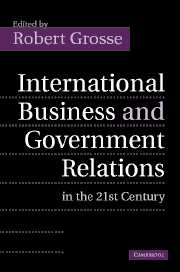Book contents
- Frontmatter
- Contents
- List of figures
- List of tables
- List of contributors
- Acknowledgments
- Introduction
- Part I History and theories of analysis of international business–government relations
- Part II The shifting international business–government partnership
- Part III Bargaining theory and the obsolescing bargain
- Part IV Host and home government views of international business
- Conclusions
- References
- Select bibliography of J. N. Behrman's works
- Index
Conclusions
Published online by Cambridge University Press: 22 September 2009
- Frontmatter
- Contents
- List of figures
- List of tables
- List of contributors
- Acknowledgments
- Introduction
- Part I History and theories of analysis of international business–government relations
- Part II The shifting international business–government partnership
- Part III Bargaining theory and the obsolescing bargain
- Part IV Host and home government views of international business
- Conclusions
- References
- Select bibliography of J. N. Behrman's works
- Index
Summary
The study of international business–government relations has evolved extensively since the early analyses after the Second World War. As Boddewyn captured in his chapter, the intellectual leaders of that era established a number of bases for further exploration. These included: Vernon's idea of the obsolescing bargain; Robinson's argument that MNEs create conflicts with national governments because of conflicting goals – and that MNE managers would thus have to try to defuse these clashes; Behrman's emphasis on the need for firms to pursue strategies that would give them legitimacy in the eyes of government stakeholders; and Fayerweather's conceptual model of the international firm which showed that the firms produced gains from global efficiency, while governments had to pursue more fragmented, national goals that often conflicted with those of the firms. Altogether, this was a very conflictive view of international business–government relations, which reflected the reality of those times.
Evolution of thinking about this subject has moved in tandem with analyses of companies in general, and also with changes in the international environment. In the first instance, a wide range of social science disciplines have turned their analytical efforts to explaining company behavior, which was previously a focus mainly of economists and management theorists. In the second case, the dramatic change in world politics with the fall of the Soviet Union, together with the enormous technological shift marked by the arrival of the internet, has left the US as the dominant global political power, with a wide range of governments and pressure groups seeking to gain advantage from their new roles in the internet economy.
- Type
- Chapter
- Information
- Publisher: Cambridge University PressPrint publication year: 2005



